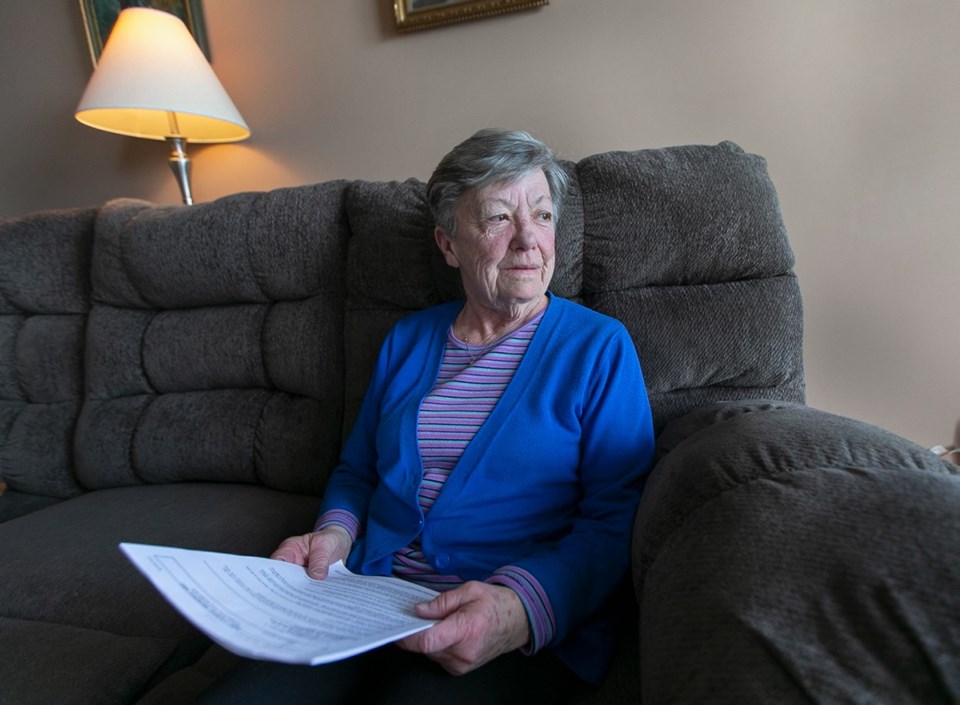A Victoria cancer survivor who lost her driver’s licence and had her car impounded after she was unable to provide a proper breath sample is relieved she has been given a second chance to have her immediate roadside prohibition revoked.
The Superintendent of Motor Vehicles has offered to conduct a rehearing of Norma McLeod’s immediate roadside prohibition, also known as an IRP, her lawyer Jennifer Teryn said.
“I’m confident we will get the IRP revoked as soon as possible and Norma can move on with her life. That woman has been through too much and she deserves justice,” Teryn said.
In February, McLeod lost her licence for 90 days and her car for 30 days even though there was no evidence she had any alcohol in her system.
In 2005, the former care aide, who volunteers with Thrifty Foods’ Sendial program, had half of the roof of her mouth removed because of mouth cancer and has a prosthesis. She has also been diagnosed with chronic bronchitis and chronic obstructive lung disease.
The Victoria senior is behind what’s likely to be the first constitutional challenge to changes in Canada’s impaired-driving laws that came into effect on Dec. 18, 2018, granting police the power to demand a breath sample from any driver they stop.
In the past, police had to have a reasonable suspicion a driver had alcohol in his or her system before demanding a roadside breath test. Under the revised legislation, a driver who refuses, or, like McLeod, fails to provide a breath sample, faces a potential criminal charge with penalties similar to an impaired driving conviction.
McLeod’s ordeal began on Feb. 14 at 9:35 a.m., when a police officer watched her come out of the liquor store at Hillside Centre with a bag. As McLeod drove off, the officer pulled her over and demanded a breath sample. McLeod was unable to provide a proper sample because of the prosthesis in her mouth and her inability to produce enough breath.
McLeod went with her daughter to see her doctor. He wrote a letter stating that McLeod has a reduced capacity to exhale: “This is further compounded by extensive oral surgery due to a malignancy with removal of her soft and hard palate. Despite a prosthesis, this would also negatively impact her ability to perform a breathalyzer test.”
Her next stop was the Driver Licensing Office on McKenzie Avenue to file a $100 appeal. But despite the doctor’s letter, the Road Safety B.C. adjudicator dismissed her appeal.
McLeod paid a $900 impoundment fee and a $500 fine. She was required to register for a one-day, eight-hour Responsible Drivers Program at a cost of $930 plus $250 to reinstate her driver’s licence.
If McLeod is successful in having the IRP revoked, the government will refund the fines and fees and the cost of towing and storing her car, Teryn said.
But they can’t compensate McLeod for the inconvenience and the distress she suffered and continues to suffer.
“Telling my kids really upset me. It was very hard and it still is,” McLeod said. “After driving for 50 years or more all I’ve had is a couple of parking tickets.”
McLeod hopes the outcome of this second IRP review will be different.
“At least they’re going to listen to it again and hopefully things will change,” she said.
Her licence was reinstated in May but in the meantime, McLeod took the bus and did a lot of walking, carrying groceries.
“It’s hard and I’m not any younger,” said McLeod, who turns 77 on Monday.
The fees and fines also left her short of money, unable to buy things she wanted to buy.
“I just hope it doesn’t happen to anyone else. It’s not fair. They seem to be picking on the most vulnerable who have trouble breathing or are handicapped. I hope it turns out the right way,” she said.
McLeod’s constitutional challenge is expected to be heard in B.C. Supreme Court in February.



